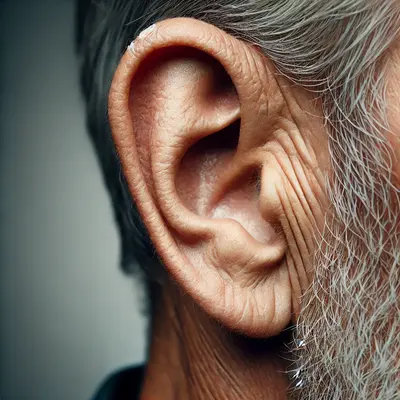Meet Henry, a 72-year-old retired teacher. Over the past few years, he’s noticed that conversations in crowded places are harder to follow. He constantly asks people to repeat themselves and often hears ringing in his ears. At first, he thought it was just part of getting older, but the struggle to hear has started affecting his daily life. Like Henry, many seniors experience hearing loss, but understanding the causes and learning how to prevent further damage can significantly improve quality of life.
Symptom Breakdown:
Hearing loss in the elderly, often referred to as age-related hearing loss (presbycusis), is a common condition that affects millions worldwide. Here are some of the common symptoms:
- Difficulty understanding conversations, especially in noisy environments.
- Frequently asking others to speak more slowly or repeat themselves.
- Perceiving speech as muffled or unclear.
- Tinnitus (ringing or buzzing in the ears).
- Gradually needing to increase the volume on devices like TVs and radios.
Hearing loss due to aging doesn’t happen overnight, but gradually, making it easy to ignore until it severely impacts communication.
Diagnostic Path: Common Causes of Hearing Loss in the Elderly
Age-related hearing loss can have several causes. Understanding these causes can help you or a loved one take preventive measures.
- Natural Aging Process:
As people age, the structures in the inner ear gradually degenerate. The tiny hair cells that transmit sound signals to the brain begin to weaken or die, leading to reduced hearing. - Exposure to Loud Noise:
Decades of exposure to loud environments, whether it’s from work, concerts, or everyday noise, can accelerate hearing loss. Noise-induced hearing loss is cumulative, meaning even short bursts of loud sounds can contribute over time. - Chronic Health Conditions:
Conditions like diabetes and high blood pressure can affect the blood supply to the ears, damaging the delicate structures involved in hearing. Additionally, some medications (referred to as ototoxic drugs) can damage the ear’s function, causing hearing loss. - Ear Infections and Wax Buildup:
While less common, untreated ear infections and excessive wax buildup can block the ear canal, causing temporary or even permanent hearing impairment in older adults.
Deep Dive: How Hearing Loss Affects Daily Life
Hearing loss isn’t just an inconvenience. It can lead to isolation, depression, and cognitive decline. Studies have shown that seniors with untreated hearing loss are more likely to experience difficulties with memory and thinking skills. This is likely because hearing plays a critical role in maintaining brain health by keeping it engaged and active. When the brain doesn’t receive enough stimulation through sound, it can lead to deterioration in cognitive function.
Treatment Comparison: Preventing and Managing Hearing Loss
While age-related hearing loss is often inevitable, there are several ways to prevent further damage and manage existing symptoms.
- Hearing Aids:
These small devices amplify sound and help make it easier to communicate. Modern hearing aids are discreet and packed with advanced technology that can filter out background noise and improve clarity. - Assistive Listening Devices:
Tools such as television listening systems or personal amplifiers can help seniors hear better in specific situations without needing to turn up the volume to disturbing levels. - Protect Your Ears from Noise:
Prevent further damage by avoiding prolonged exposure to loud sounds. Wearing ear protection like earplugs or noise-canceling headphones can minimize the risk of noise-induced hearing loss. - Regular Hearing Checkups:
Like other parts of your health, hearing tests should become a regular part of medical care as we age. Early detection allows for quicker intervention, slowing the progression of hearing loss. - Treating Underlying Health Conditions:
Managing chronic conditions like diabetes, high blood pressure, and cardiovascular disease can help protect hearing. Avoiding ototoxic medications when possible is another preventive step.
Outcome Story: From Frustration to Better Hearing
Let’s look at Helen, a 68-year-old retired nurse. Helen’s hearing had been gradually deteriorating for years, but she didn’t realize how much it affected her daily life until she stopped enjoying group conversations. After a routine hearing test, Helen was fitted with hearing aids. With the help of assistive devices and regular checkups, she not only regained clarity in conversations but also found herself more socially active and engaged.
Prevention Tips Table
| Prevention Tip | Why It Helps |
|---|---|
| Use ear protection in noisy areas | Reduces risk of noise-induced hearing loss |
| Regular hearing checkups | Early detection allows for better management |
| Manage chronic conditions | Keeps blood supply to the ears healthy |
| Avoid ototoxic medications | Prevents drug-induced hearing damage |
| Stay socially active | Keeps the brain engaged and can slow cognitive decline |
Don’t Ignore Hearing Loss
Hearing loss in the elderly can have profound effects on one’s quality of life. By understanding the causes and taking preventive measures, seniors can protect their hearing and maintain their social connections and cognitive health. If you or a loved one are experiencing hearing issues, early intervention is key to preventing further damage and improving quality of life.









